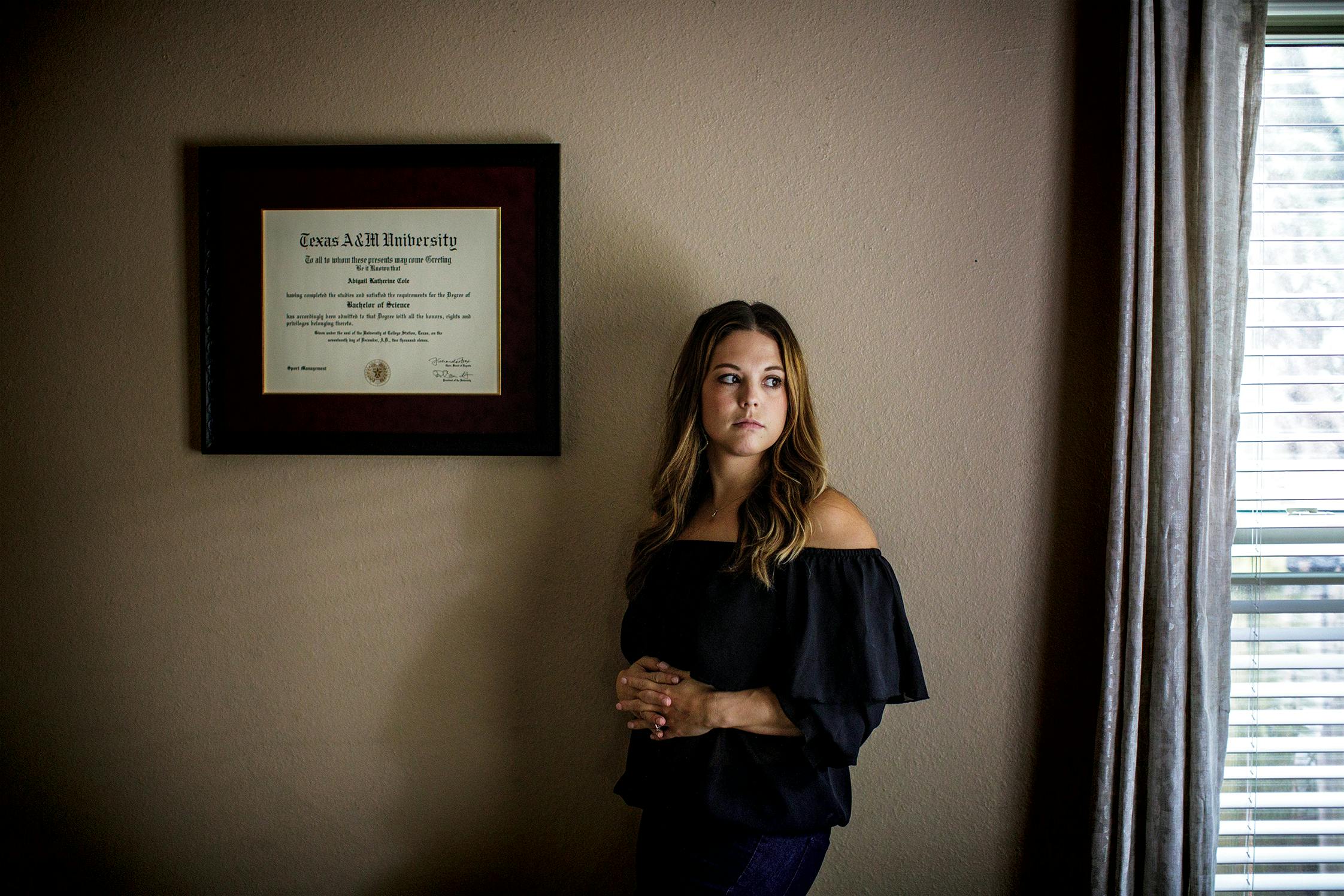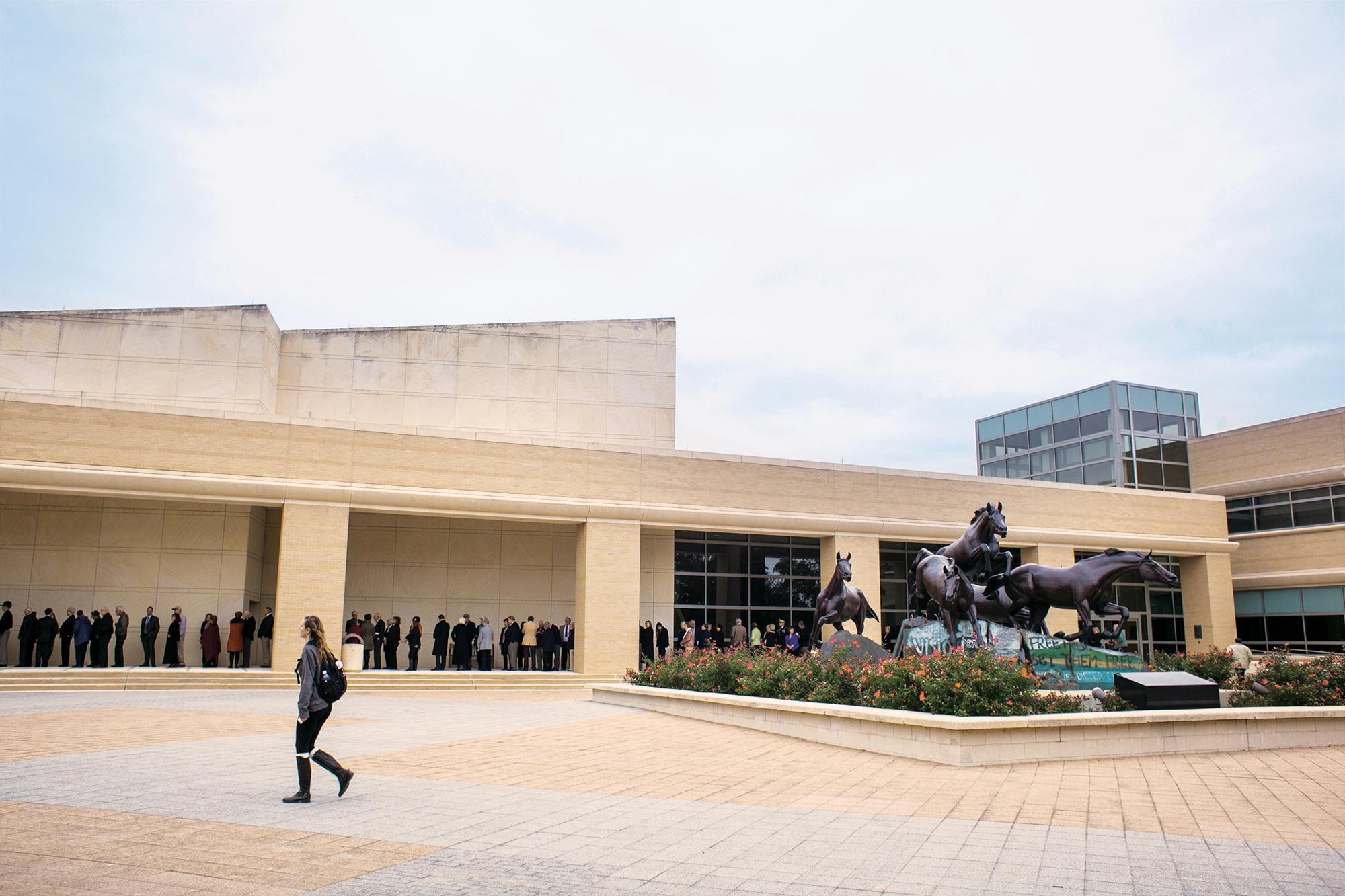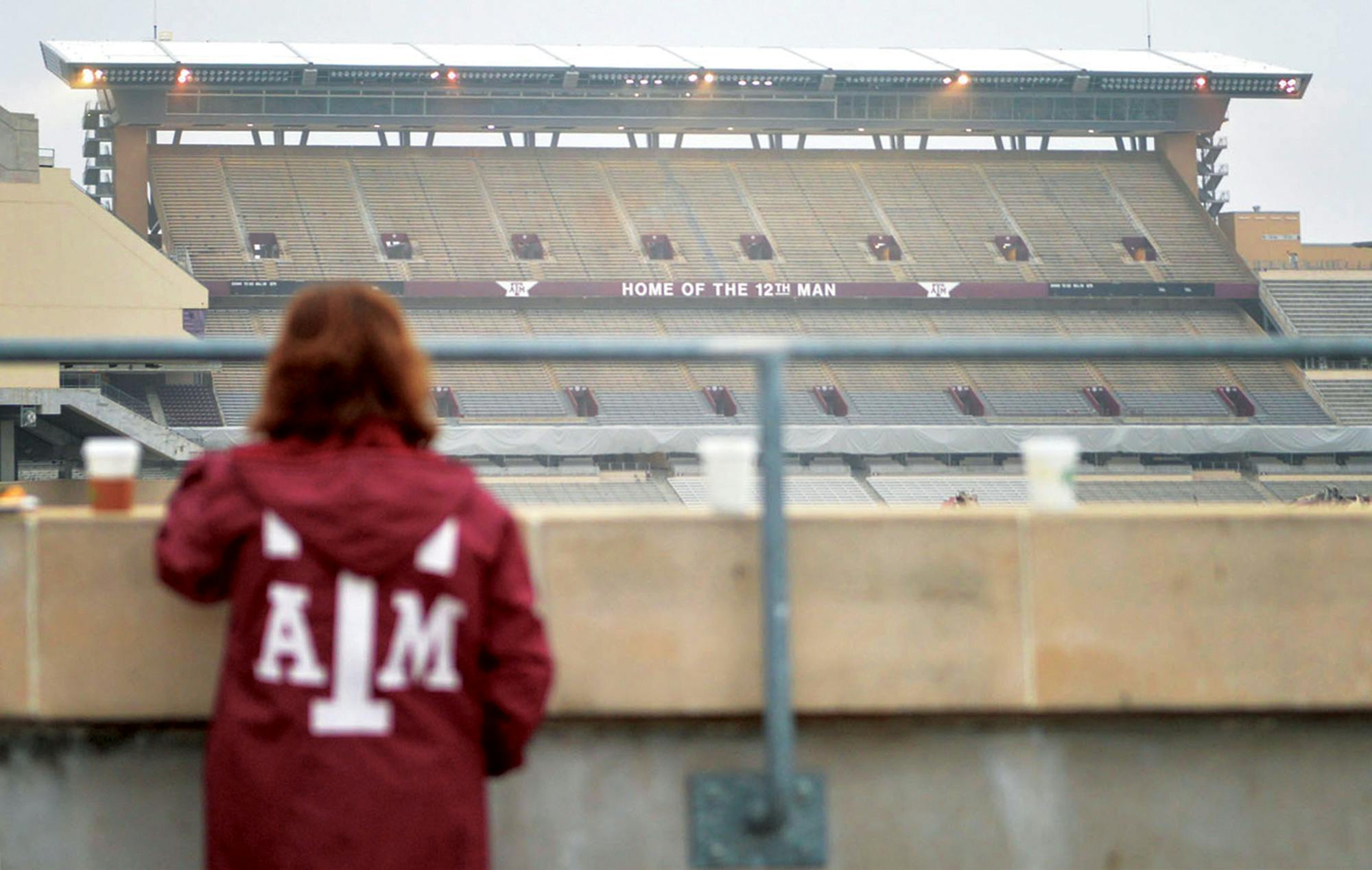On a Monday morning in late August, in a beige conference room on the second floor of the stately Jack K. Williams Administration Building on Texas A&M’s flagship campus, university president Michael K. Young announced sweeping new policies addressing sexual assault and harassment on and around campus. “I think it’s clear we’ve been working on this in a pretty robust way, certainly for the three years I’ve been here,” Young said, not mentioning the rash of bad publicity that appeared to be the impetus for the policy change. “I think this was another useful point to energize those efforts.”
Select media were invited to the event, held at the end of a summer in which A&M made national headlines for the way the university handled the sexual assault and harassment cases of a number of female students. These women had taken to social media after frustrating encounters with the A&M administration. They appeared on NBC’s Today show, and had spoken on the steps of Congress—not only to discuss their treatment by fellow students, but to highlight the university’s treatment of their cases. According to these female students, A&M handed out minor penalties for major infractions; led them through confusing and contradictory processes regarding Title IX cases involving sexual misconduct and worse; and responded to their concerns with tone-deaf or dismissive replies.
A&M had hired a law firm to investigate its practices and come up with recommendations. It also formed committees to study the situation and propose solutions, committees that included A&M administrators and members of a small group of current students and alumni who publicly identified themselves as sexual assault survivors.
These women had worked to change the A&M culture under the name “Twelfth Woman,” in deference to the school’s famed 12th Man group of Aggie football tradition. Their tactic—inspired by the #MeToo movement—of speaking publicly about painful experiences in which they survived sexual assault or sexual harassment seemed to have spurred real action on the university’s part. And this moment, during which sweeping changes at both the campus and the system level were announced, should have felt like a triumph for those women.
But most of them weren’t there that day. The university, they said, never told them about it. Only one member of the group, who lived nearby, was able to attend the meeting. For her and for others, the press conference felt like more of what they’d come to expect from A&M: no clear communication and little acknowledgment of their feelings.

Ironically, the person who laid the foundation for Twelfth Woman by being the first to speak out publicly never joined the organization itself. Hannah Shaw didn’t intend to start a firestorm. She never expected that anyone would care. She was just so frustrated.
One night during her sophomore year in 2015, Shaw met a student named Austin Van Overdam, who was on the A&M swim team, through the online dating app Tinder. She went to his apartment. She said what started as a consensual sexual encounter turned into something frightening and non-consensual. Nine months later, Shaw was still suffering from nightmares and went to the doctor to address the symptoms of post-traumatic stress disorder. (Van Overdam’s attorney, when asked what happened, said, “Ms. Shaw hooked up with Mr. Van Overdam via Tinder. She voluntarily engaged in three acts of sex with him, all occurring in rapid succession in their one and only meeting. Mr. Van Overdam engaged in a voluntary, one-time relationship with Ms. Shaw and he has never assaulted her.”)
After visiting the doctor, Shaw went to A&M campus police, who sent her to the Office of the Dean of Student Life. The investigation moved quickly. Less than a month after Shaw went to police, the university held a hearing on three charges: sexual abuse, sexual contact [without consent], and dating violence. The university found Van Overdam responsible on the first charge, and determined that the evidence for the other two was insufficient. Shaw says that she was told she “can’t really have a lawyer, because they’re not allowed to say anything” during the hearing. Van Overdam attended with his attorney.
The hearing process was difficult for Shaw. She answered, in detail, questions about what happened—about which acts were consensual, about which acts were not, about whether she was scared enough that she wasn’t able to consent after Van Overdam grabbed her wrists to keep her from pulling away.
At the end of the hearing, she was given the opportunity to read a statement about how the incident with Van Overdam had affected her. Curiously, she thought, the panel asked her what Van Overdam’s punishment should be. Shaw told them that after listening to Van Overdam throughout the hearing, she worried about being the person who “ruined his life,” and told the panel that that wasn’t her intent. Later that evening, she received an email from an assistant director for Student Affairs explaining that, because of her “support for a lighter sanction,” Van Overdam would get a six-month suspension from the university, along with probation and a one-time sexual consent training session on campus. He appealed, and Shaw was once more required to go through the details of the encounter and to suggest an appropriate sanction.
“I was just sobbing at the appeal, and they asked me again,” Shaw recalls. “I told them, ‘I don’t care at this point. You guys have dragged me through this. I’ve had to sit here, and this is probably the fifth time I’ve had to go over in detail what happened to me.’” The panel maintained the initial finding and sanctions.
Shaw remained on campus and didn’t encounter Van Overdam again. Nearly three years after their encounter, in the spring of 2018, she learned that he was back on the swim team—and that the semester he had been suspended hadn’t cost him any of his NCAA eligibility, effectively voiding out one of the larger consequences of his actions. (In June, Van Overdam filed a lawsuit against the university, claiming that its policies demonstrate “bias against male students.”)
Shaw assumed that there must be some mistake—that maybe people within the swim program didn’t know what had happened. She sent an email to the program’s head coach.
“I thought that maybe he didn’t know, and if I told him, maybe he’d reply back and say, ‘I’m so sorry, Hannah, I will address this immediately,’” she says. The coach didn’t respond personally, though. Shaw’s email was forwarded within the department, and she received a response from an administrator named Lori Williams.
Hannah Shaw speaks with a laconic drawl befitting a Southerner who moved to Texas, and she carries herself in the same measured, even way. When she received Williams’s email, she didn’t react immediately. Instead, she sat with her frustration for five days. Then she got on Twitter on June 7 and posted, “Me: I’m unhappy the boy who r*ped me is back on the swim team,” and included a screenshot of Williams’s response, which concluded, “I regret your displeasure with the perceived impact, and I wish you all the best as you continue to seek healing.”
Me: I’m unhappy the boy who r*ped me is back on the swim team
Texas A&M: pic.twitter.com/PJROvrdURb— hannah 🍌 (@hannahslol) June 7, 2018
Shaw’s post struck a nerve with a number of her fellow students, and four days later, another student tweeted about her own experience. As the daughter of two proud Aggies, Meghan Romere never considered going anywhere other than Texas A&M. When an Aggies football game her freshman year was delayed by rain, she stood with the 12th Man for six hours, as the clouds opened up above them and the team waited in the locker room. When her Ring Day came, she dutifully dunked her school ring in a pitcher of beer and tossed it back. “It took me six minutes, and I threw up three times, but I did it,” she says. She loved her school, believed it to be better than other schools, believed that the Aggie values instilled in her—both by the university and by her parents—were worth honoring. She believed that the sort of things that she’d heard were happening on other campuses—things she heard about football players getting away with—wouldn’t happen at A&M, and if they did, any true Aggie would take action to put a stop to it.
She doesn’t believe that anymore.

Her saga began two years ago, on October 24, while she was working as a tutor in the athletic department. That morning, she was assigned to work with Kirk Merritt, a four-star recruit who was in the midst of a redshirt year after transferring from the University of Oregon. During the tutoring session, Romere says, Merritt started masturbating in front of her, his hands in his shorts moving in what she would later describe to police as a “rhythmic up-and-down motion,” the tip of his penis protruding from the waistband. Shaken by the encounter, she left the room and called her mom. A few hours later, she texted a supervisor, who told her to visit the office the next morning.
That next day, another student met with Merritt for a tutoring session. Merritt pulled down his shorts, pulled out his penis, and started masturbating in front of the second tutor, police reports said—an escalation of the behavior that Romere witnessed. Merritt was suspended from team activities, pending an investigation.
Romere and her fellow tutor went through the student disciplinary process at A&M, but that process quickly turned byzantine. The initial investigation took a month. On November 28, Romere received an email from Dayna Ford, assistant director for Student Affairs, informing her that Merritt had been charged with “sexual exploitation.” Romere was instructed to attend a hearing on December 2.
Romere was told that she could bring an adviser to the hearing—but, she said, she was discouraged from bringing a lawyer. She chose to bring her dad.
Merritt arrived at the hearing with a lawyer in tow. The lawyer helped the football player craft a novel alternative explanation for his behavior—that Merritt had a previously undocumented case of jock itch—and the panel that led the hearing found it compelling. (Merritt would later plead no contest to indecent exposure in court.)
Hi Twitter. I don’t tweet often, but when I do, I really mean it. Sharing this has taken me over a year and a half, but I’m tired of waiting for @TAMU to step up. Please please share this. It’s time to do something. pic.twitter.com/grEvQ1sVzR
— Meghan Romere (@meghs33) June 12, 2018
After Romere went public, she discovered that there were a number of women who’d had similar experiences at Texas A&M.
One of them, a 2012 graduate named Abbie Hillis, started a Facebook group for survivors of sexual assault and sexual harassment at the university. Based on what these women in the closed group were sharing, a pattern emerged—one that the female students who would go on to form Twelfth Woman would describe as the university “creating a misleading and confusing system for survivors of gendered violence.” There appeared to be a haphazard approach by the university to enforcing its own policies, and a system in which male students came to hearings accompanied by defense attorneys, while female students were expressly encouraged by A&M administrators to show up counseled only by best friends and parents. And it seemed that those who entered the hearing room with professional advocates tended to receive the best results.
Five different women told Texas Monthly similar stories—that they were actively discouraged from retaining lawyers. Hillis, who reported to College Station police in 2010 that she’d been raped by another student at a Christmas party, was told after her sexual assault nurse examination that the university’s student affairs office would be her best option for seeing the other student held accountable.
“I was told that a lawyer wasn’t necessary—that it would just be us talking through the details of the evening, and that once we provided all of the details, the review panel would look at the facts and make a decision,” she recalls. “But he had multiple attorneys present, and I had my mom. I had no questions prepared. I just thought I needed someone to hold my hand and tell me it was going to be okay.”
The Facebook group that Hillis started now has more than two hundred members. Most of those women didn’t pursue disciplinary sanctions against their attackers, but some did. One of them, Kendra Bailey, says that she was told by Dean of Student Life Anne Reber, when Bailey asked whether she needed a lawyer, that “lawyers slow everything down.” Her parents, concerned that their daughter was being discouraged from consulting with an attorney, hired one that night. (According to an A&M spokesperson, “Dr. Reber said she did not make such a statement.”) Bailey was frightened of the student she reported, and prior to hiring an attorney, she had been told that the no-contact order between the two of them meant that she would need to leave a building if he entered. A day after she retained a lawyer, that other student was placed on interim suspension pending the hearing. “I’d felt like I was a burden on [Dr. Reber], like I was doing something wrong by reporting” her assailant, Bailey recalls. “Then a day later, they suspended him. I was like, ‘It took a lawyer for y’all to do that?’”
On June 25, Meghan Romere, Abbie Hillis, and four other members of Twelfth Woman met with A&M administrators at the Stella Hotel in Bryan. The women arrived with an attorney from Dallas who specializes in Title IX litigation. They weren’t threatening a lawsuit, they say—they just wanted the school to take them seriously. They’d had a hard time getting commitments from the university that senior administrators would attend, and were looking for whatever leverage they had.
“We were advised to say, ‘No president, no meeting,’” Hillis recalls. Two days before they were scheduled to meet, A&M President Young hadn’t yet agreed to attend, and they decided to play “hardball,” she says, and made a list of conditions they wanted the university to meet. They finally received confirmation that he’d be there. They prepared a sign-in sheet, a piece of printer paper with lines for people to write their name, affiliation, and role. The members of Twelfth Woman wrote things like “Current Student” or “Former Student,” while the A&M representatives signed in as “Provost” and “TAMU President.”

A&M took the meeting with Twelfth Woman at the Stella Hotel seriously. The group of women knew that President Young would be there; they were surprised when Chancellor John Sharp walked in the door.
Hillis ran the meeting, and she skipped introductions—instead, each woman told her own story, then the group questioned the administrators over the course of the next several hours. The administrators answered the questions, though their responses left the women unimpressed.
Today, when Romere and Hillis talk about the university, their tone is skeptical. There are administrators they like—Hillis singles out Provost Carol Fierke—but they don’t trust that the administration is working to improve its performance around sexual assault. They worry instead that the university is working harder to rehabilitate its own reputation after the women started talking to the media.
Some of the earliest concrete actions that A&M took felt suspicious to them. Following the wave of negative publicity that resulted from Shaw, Romere, and Hillis going public—two of the women appeared on the Today show in early June—the university contracted a law firm that specializes in Title IX compliance to audit its practices.
The firm they selected, the Kansas City–based attorneys of Husch Blackwell (which also has an office in Houston), had most recently completed an investigation of Michigan State University, which declared last November that the university’s “Title IX policies and procedures are among the most comprehensive and robust we have seen.” In the months that followed, of course, MSU team doctor Larry Nassar was sentenced to 175 years in prison after pleading guilty to multiple accounts of sexual assault; it was revealed that MSU’s Title IX department gave the woman who reported him for misconduct an altered version of the report; university president Lou Anna Simon resigned; Nassar’s boss was arrested on criminal charges related to his failure to protect patients from Nassar; and the school settled a lawsuit against Nassar’s victims for $500 million. (After much of this information became public, Husch Blackwell issued a second report, finding that the university “has been less successful in implementing some of its education and prevention programs” and finding “significant misunderstandings and misinformation.”)
Romere had another experience that led her to believe the university was being heavy-handed in its attempt to control what information was reported. On June 22, she invited Texas Monthly to the university’s student conduct office to access her file. University policy says that students are only able to access their files when they’re physically present, that they’re restricted from making copies or taking photographs of the documents, and that the only documentation they can take with them must be copied by hand. With Romere’s permission, we hand-wrote notes from her file—but after about twenty minutes, an administrator came into the office we were in, told us to stop taking notes, retrieved the file folder, suggested that they might confiscate a reporter’s notebook, and finally told us to return with Romere later. Only then would she receive redacted copies of some of the documents contained within the file. Other documents, including audio recordings from the hearing, were not included or made available. We were told that the new policy—to give Romere access to redacted copies of some of the documents in her file, after telling her for more than a year that she could only see them while she was in the office—was determined that morning by the university’s legal counsel, who did not immediately return a request for an explanation for the change. (An A&M representative, speaking on background, claimed that Romere had been “inadvertently given an unredacted copy” of her file that day, which is the same file Romere says she had been given access to for the previous year.)

Shortly after the meeting at the Stella, the university formed committees—working with Twelfth Woman—to create new policies around sexual assault and harassment. Those committee meetings could also be fraught, though. “I got talked over a lot,” Twelfth Woman member Kirsten Covington says of the meetings.
The policy changes announced at the August 20 news brief include a new model that sets minimum and maximum sanctions for different charges based on the severity of the violation—which means that the next time a student like Hannah Shaw addresses a hearing panel, she won’t have to wonder if she might bear the responsibility of giving her attacker a lesser charge. Students who are found responsible and are suspended for a year or more from the university can no longer represent the university as a member of an athletic team, in the Corps of Cadets, or through any other campus organization upon their return, nor can they receive university-administered scholarships—which means that a student won’t see the person who attacked them, if they’re found responsible and suspended, celebrated by A&M for their athletic accomplishments. Any student found responsible for violating the student conduct code and suspended, dismissed, or expelled will receive a notation on their A&M transcript.
The university is also aiming to streamline the reporting process and create a more robust infrastructure. Cases will now be handled by a single case manager so that people reporting do not have to tell their story over and over again to multiple staff members. Within the next few months, A&M will increase the number of counselors on campus, and has announced plans to hire more staff for the Title IX department, including additional investigators and case managers. The changes go broader, even, than sexual assault—they also make consensual relationships between staff and undergraduates a fireable offense for the staff and faculty members involved. Cases in which employees are found to be making persistent unwanted sexual advances toward colleagues or students will, the new policy says, be treated as harassment, another offense that can result in termination.
The new policies—if they’re followed and if the university is held accountable—should be good for future students and employees. But getting the university to a place where they were ready to make those changes came at a cost.
It’s been expensive, for one, and a disruption in these women’s daily lives. Hillis has an infant son; Romere spent the summer dividing her time between her newfound activism and preparing for her first semester of law school. They’ve had to cut short family vacations and miss work, and they can track the expenses related to their activism into the thousands of dollars. Both Romere and Hillis have given some thought to walking away from all of this. They’ve made a difference in some ways, and the women in the group found each other. “If we stop, we’ll still be friends, right?” Romero asked one afternoon while holding Hillis’s baby.
More than anything, what they say they want from A&M is an apology. “I think what bugs me the most is that they won’t just come out and acknowledge that they made a mistake,” Romere says.
All of the women in the group recall the past few months with mixed feelings. “We’re all exhausted. It’s brought out emotions from things we didn’t deal with. We’ve sought counseling,” Hillis says. “Telling your story over and over again—I was an emotional wreck. It hits me straight in my chest.”

Walking up to the front door of the Romere family’s house in Round Rock is like passing through a miniature shrine to Texas A&M. Even now, nearly two years after the Romeres’ daughter filed a police report about an A&M football player, you’d still pass a truck with A&M vanity plates, an A&M flag on a wrought iron pole in the yard, and a cross with a maroon A&M logo embedded within it near the door. Meghan Romere may now be attending the University of Texas Law School, but she and her family are still Aggies through and through. Like Hannah Shaw, she still wears her Aggie ring every day.
Neither Romere nor Hillis ever expected to become activists. When they hear the word used in reference to them, they laugh, a little nervous. It’s not part of how either woman self-identifies. (Covington says that she expected to become an activist in her life, but not for sexual assault survivors.)
“I don’t know if I’d ever use the word ‘activist,’ but we are activating people,” Hillis admits. “So maybe we could start calling ourselves that.”
One of the people the Twelfth Woman has activated is U.S. Representative Ted Poe, a Republican who represents part of Houston. One of Poe’s staffers reached out to them in early July. He had, Hillis says, been looking for someone who could give a face to sexual assault prevention bills he wanted to introduce—and the Twelfth Woman group was a good fit.
“The one thing that everyone keeps telling us that makes our group so unique is we’re all willing to stand up with our name, with our story, and with our face,” Hillis says. “I think that’s what interested him so much.”
They were invited to Capitol Hill to hold a press conference with Representative Poe and sit in the House Gallery when he introduced three bills around campus sexual assault. It was an exciting moment for them, and another tangible sign that their group was making a difference.
Neither Romere nor Hillis ever expected to have this relationship with their alma mater. Despite living less than ten minutes from each other in the same Austin suburb, when we met them together for the first time at the Romeres’ house, they’d only known each other for four days. They had quickly bonded, though—at least as much over their shared passion for this cause as over the fact that they both had their time at A&M marked by experiences that left them confused and disappointed. And through it all, they do still speak fondly about Texas A&M, even if the nature of what they love about the university has changed as they assess how it has handled all of this.
“A&M makes a big deal about creating leaders in all fields,” Romere says. “And they’ve succeeded. They gave us the tools, and now we’re going to use them to make A&M better.”
- More About:
- Crime
- College Station







